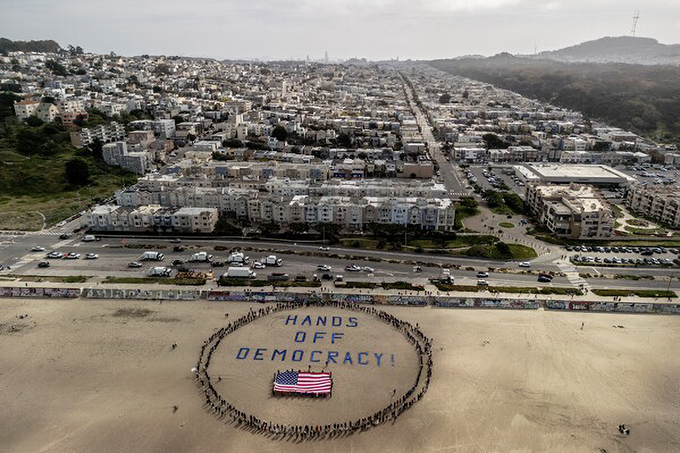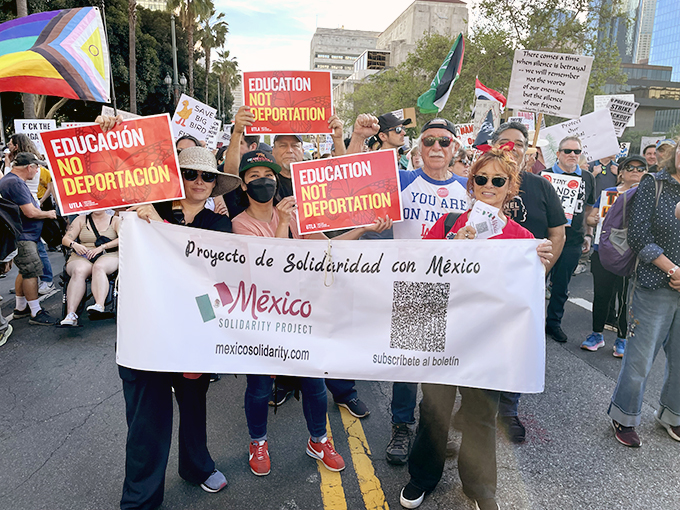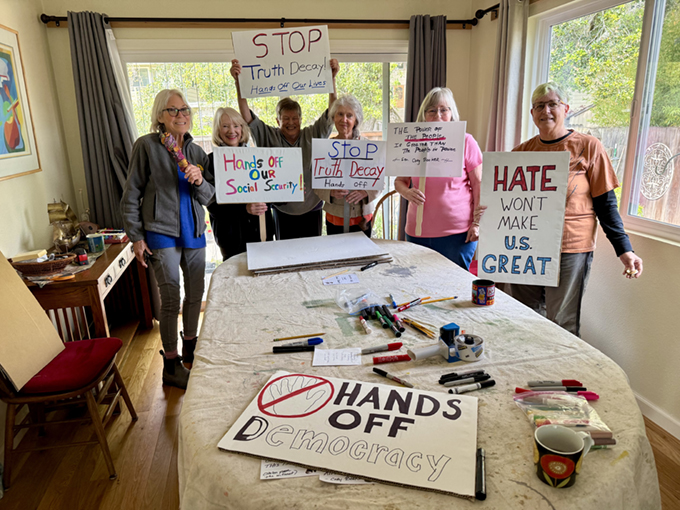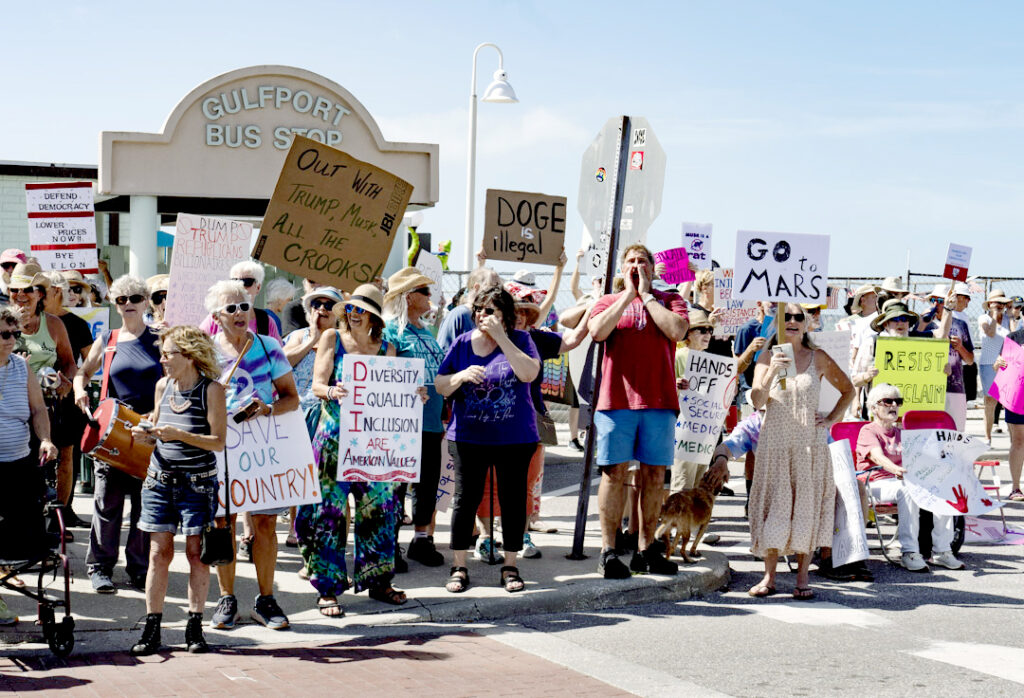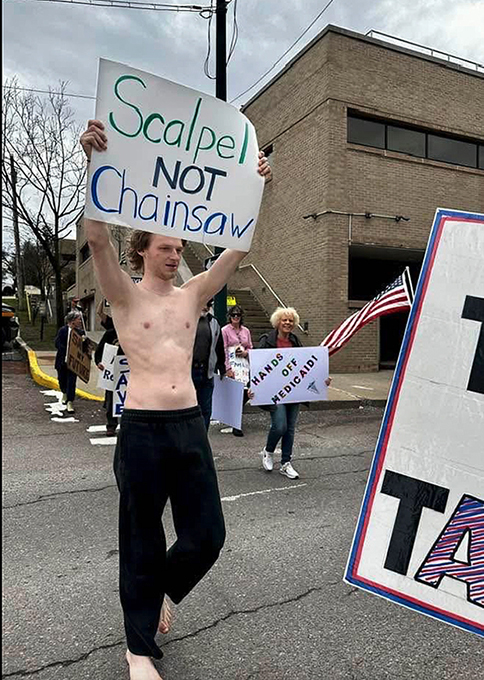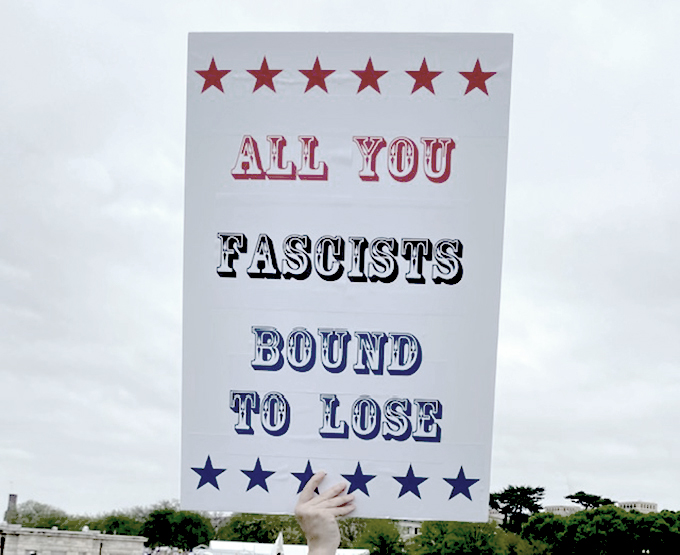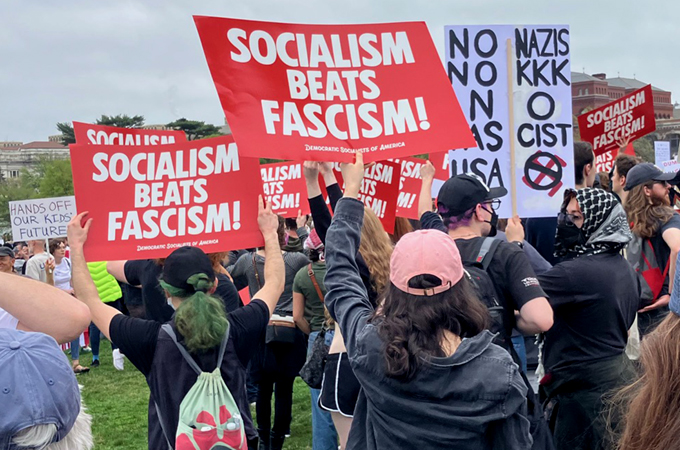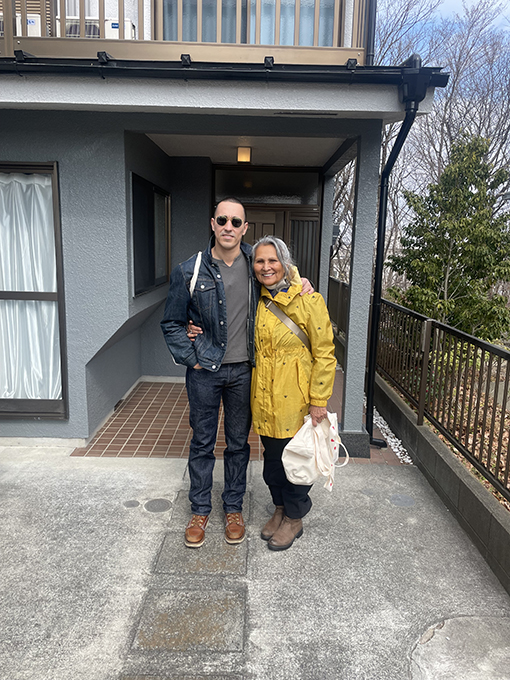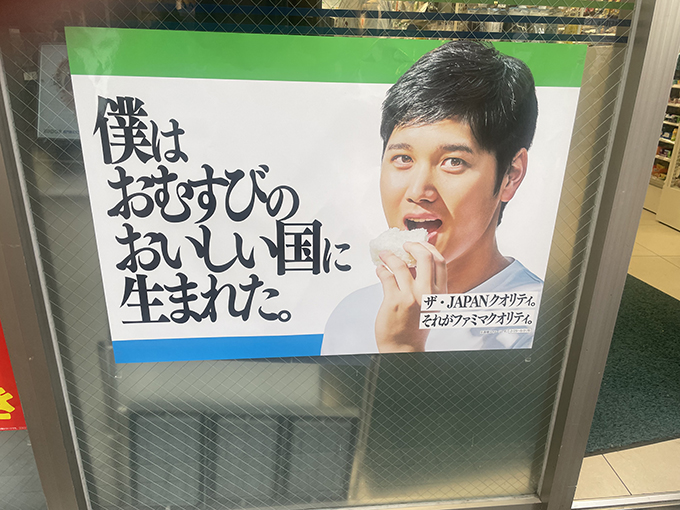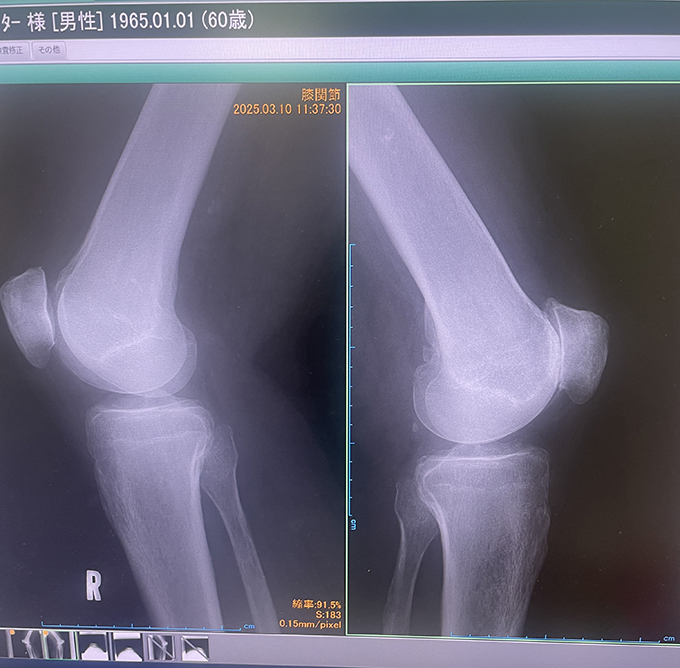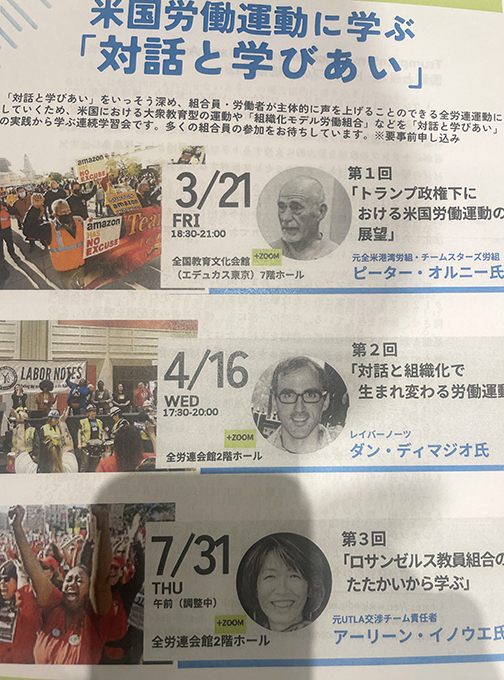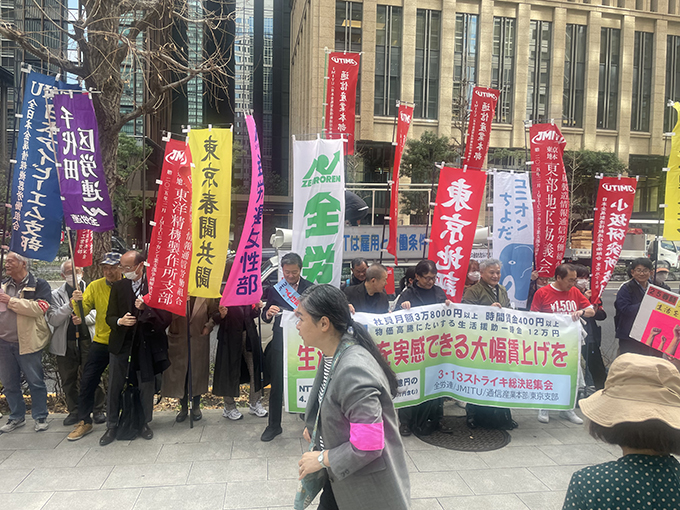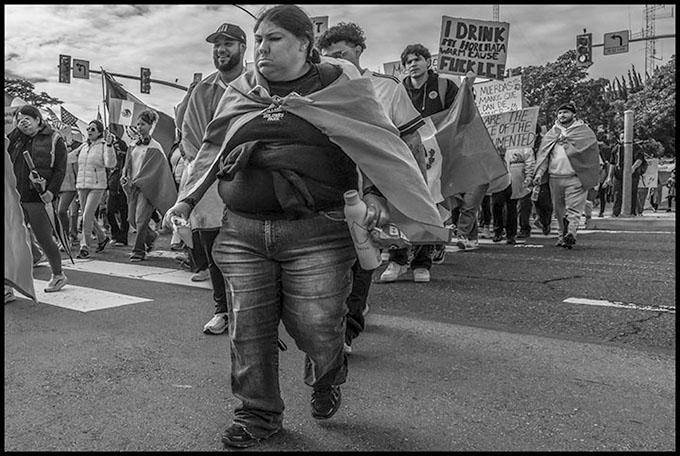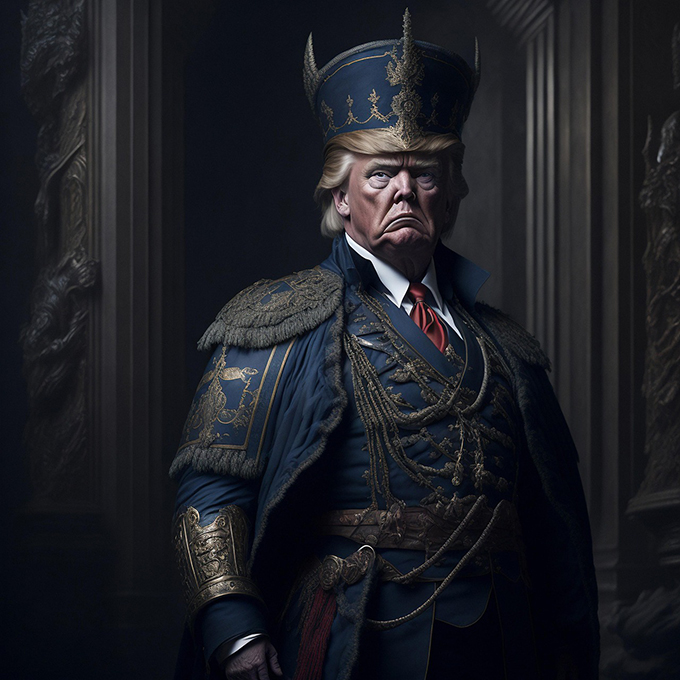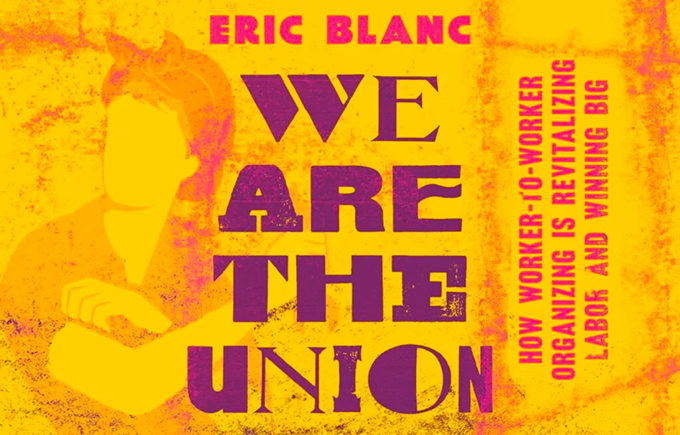Hands Off! Post 4
By The Editors
This Is What Democracy Looks Like
Sterling Smith – Fayetteville, Arkansass
This Is What Democracy Looks Like
And I went down to the demonstration
To get my fair share of abuse
Singing, “We’re gonna vent our frustration
If we don’t we’re gonna blow a fifty-amp fuse”
Memories of the Rolling Stones and the protest songs of the 60’s echoed in my mind as I rounded the street corner to approach the Washington County Courthouse in downtown Fayetteville, Arkansas. I was greeted by a cacophony of sounds as over eight hundred people chanted and sang, accompanied by the horns of countless cars on College Avenue honking in support of the demonstration. Men, women, families, students, retirees, working folks, gays, straights, and trans… just people coming together to support a common cause. There was not any abuse that I could see, unless you count the guy in the pickup truck who drove around the block a couple of times to wave at the crowd with his middle finger. But there was a lot of frustration.
On April 5th, 2025, the community of Fayetteville braved wind, rain, and freezing cold to vent their frustration at what is happening to our country. Multiple demonstrations for the day – We the People Veto Project 2025, Hands Off, the 50501 Movement, and the Women’s March – blended into one large demonstration in our beautiful town. A plethora of signs was visible, supporting a variety of causes, from LGTBQ+ rights to Vets Against Fascism… from Vote the Bums Out to Support Our Labor Unions. One might get confused as to what this demonstration was all about, except for one over-arching theme… people are fed up with the dismantling of the federal government to ultimately “line the pockets” of the ultra-rich.
After an hour of protesting, the crowd peacefully marched to the Town Square to hear several speakers. Despite the frustrations of our times, joy and enthusiasm spread through the crowd as people remembered that we are strong when we find unity and common cause in the community! It’s going to be a long fight; but together, we can move past our frustrations to get what we need; and what we need is to change the trajectory of our country, and the world! Seems to me the Rolling Stones got it right all those years ago.
You can’t always get what you want
But if you try sometimes, well, you just might find
You get what you need
Bill Gallegos – Los Angeles, California
It was truly a march and rally of the Rasquache Liberation Front — a raggedy festival of the oppressed on April 5th in downtown Los Angeles. This gathering of 30,000-40,000 people was one of half-a-dozen such marches throughout the LA-area and one of the estimated 1500 that took place throughout the US. What was wonderful about the LA event was its joyful and creative militancy. Lots of “Fuck Trump” and “Fuck MAGA” signs but also hundreds of homemade signs demanding hands of immigrants, hands off social security, hands off Trans folks, hands of federal workers, hands off Medicare Education Not Deportation. While these were demands that the MAGA confederacy immediately end the political chainsaw they are taking through nearly all of the political and social gains of the 20th century and their horrendous attacks against immigrant from the Global South, they had an underlying theme of demanding something much better — for immigrant workers to be treated with dignity and respect, for housing, food, and healthcare for everyone in this richest country in the world, for an end to the US support for Israel’s genocidal war in Gaza, and for a democracy not controlled by money and oligarchical power. We marched behind a banner of the Mexico Solidarity Project, a project of tremendous importance as the US empire seeks to make Mexico’s progressive social-democratic government bend the knee and kowtow to the US political and economic agenda. While we yelled ourselves hoarse chanting the many slogans against Trump and MAGA my favorite was “Internationalism is Strategy, Not Charity”!!!!
Molly Martin – Reporting on April 5 demos in the North Bay
“It’s because of protests across the country that we have voting rights, that we have civil rights, and believe me, it’s because of turnouts like this…that got my ass home from Vietnam,” said my Congress rep. Mike Thompson. He was speaking to one of the huge protests against the Trump administration in towns in Sonoma and Napa counties.
Here in the North Bay, where a third of our population is immigrants from Mexico and Latin America, citizens are organizing to protect undocumented people from deportation. In an economy dependent on agriculture, farmers worry about cuts to their workforce. Last month ICE walked unannounced into the probation department in Santa Rosa, handcuffed a man newly released from jail, and forced him into a van waiting outside before anyone could respond.
Wine country, with its reputation as an upper middle class stronghold, has plenty of poor people who depend on government programs for food and housing assistance. Among the 5,000 folks gathering in Santa Rosa on April 5, we saw lots of old people carrying signs protesting cuts to Social Security, Medicare and the Veterans Administration. The young are angry about cuts to DEI programs, education and environmental protection. If there were counter protesters I didn’t see them.
…
Tomorrow from “Hands Off” demos in London, England and Washington D.C.
Hands Off! Post 3
By The Editors
Jay Youngdahl – Gulfport, Florida
Numerous rallies took place in western Florida on April 5th. The largest was in Tampa, but significant demonstrations occurred in the counties around Tampa, including in very conservative counties such as Pasco and Manatee. Pinellas County alone had three rallies.
The first to kick off was in Gulfport, Florida. Around 250 protesters, mainly retirees, stressed their concern about the loss of democracy and potential impending fascism. The most popular chant was “This is Democracy Looks Like.” Interestingly, issues of Gaza and trans rights, for example, were not seen in the protest signs. Nor was support for sending more US citizen tax dollars to support the European military alliance, NATO, one of the specific demands of the national organizers.
Jon Melrod – Santa Rosa California
As we approached the freeway off ramp to Santa Rosa, a small California wine country city with a population of some 175,000 people, traffic engulfed us. “Could all these people possibly be heading to the demonstration”, a voice in the back seat questioned. As soon as we hit the city streets, the answer to the question was visible on sidewalks, in the town square and on the streets. Over 5000 people had responded to the call for Hands Off!
I was immediately struck by the contagious, upbeat mood of comradeship and community that pervaded the crowds. Yes, we were all seething with anger at what the Trump/Musk cabal has unleashed, but we took heart from the endless lines of rowdy protestors on every sidewalk and street corner in central downtown.
One of the outstanding features of the protest was the creativity that folks put into their picket signs. While I have been to literally hundreds of demonstrations in my 60-year life as an activist, many were defined by the pre-printed signs handed out by various political groups. At the Hands Off!rallies, creativity abounds with pithy wording on homemade picket signs. “Porche = Fast, Ferrari = Faster, Tesla = Fascist”, “No One’s Illegal”, “Fight Truth Decay”, and luckily a few signs supporting the Palestinian cause “Hands Off Gaza and the West Bank!”.
Although there were only a smattering of signs calling out the genocide and destruction of Palestine, there were those who made the connection. If you were to ask me what criticism I had of the rally it would be the failure to link such issues as the cause of Palestinian liberation and the critical struggle to stand with, and defend, the immigrant community from the general crisis of imperialism that is perpetuating suffering on masses of people around the world.
Lastly, we must look to reach out to other communities that were underrepresented. There is a large Latino population in Sonoma County, where Santa Rosa is located, yet as far as I know there was little or no outreach to link the issue of the Latino community with the Hands Off!movement. Similarly, young people were underrepresented. With a junior college and branch of the State college system locally, an effort should have been made to reach out to these constituencies.
Overall, the rally was a huge step forward. In the last week I have attended rallies to support Vets, picket lines of 500 in front of the Tesla dealership, and a large rally in support of postal workers. The commonality – 80% – 90% of those driving by honked car horns, raised clenched fists and “V” signs, and showed widespread support that needs to be tapped and activated as we go forward.
Len Shindel – Garrett County, Western Maryland
Upwards of 74 percent of voters in Garrett County, Md.—three hours west of Baltimore, bordering West Virginia and Pennsylvania—voted for Donald Trump. No Democratic candidate for POTUS has ever garnered the majority vote here.
While the county was home to the Garrett County Roads Workers Strike of 1970, the longest public worker [AFSCME] strike in U.S. history, unions here are generally weak. Wages in the county are only a bit more than one-half of the state’s median. The Democratic Party in the county is overwhelmingly composed of aging transplants, many of whom own expensive homes around Deep Creek Lake, the state’s largest.
Against this backdrop, a high-ranking retired federal employee [U.S. Customs] proposed a sign-waving on a busy corner of the county on April 5. She suggested calling attention to attacks on democracy and the devastating effects of federal budget cuts in a county where 65 percent of revenues from hospitals, medical centers and nursing homes comes from Medicaid.
Between 110 and 130 county residents showed up with creative signs and strong spirit. The signs spotlighted cuts and democratic rights, staying in line with the organizers’ recommendation not to overly focus on Trump or Musk alone. Many folks driving by honked horns. Opposition was relatively subdued compared to similar activities in the past.
In a humorous finale, demonstrators parading in front of the courthouse and jail, most of us in our 60s and 70s, were joined by a young resident who was shirtless and barefoot. We might have awakened him. But he woke us up to the potential to involve more young residents in the fight. He said he was interested in the next meeting of Garrett Forward, a newly formed group, loosely affiliated with Indivisible.
Members of the group had previously published an ad in the local newspaper signed by “Concerned Retirees of Garrett County” outlining how local institutions and non-profits would be affected by cuts. The facts came from one-on-one discussions with leaders of those entities who were very willing to talk and welcomed support. Residents came to a board of commissioners meeting with the ad in hand to question our elected officials about how the county will help make up for lost funding.
More ads and letters to the editor are planned from educators and military veterans. We see great opportunity in leveraging the credibility and authenticity of our occupations and service to the community to inform low-information residents and voters about current threats.
Garrett Forward members plan to move more of the energy from April 5 into the chambers of the county’s board of commissioners, demanding more transparency and encouraging public dialogue over how the county will deal with budgetary restraints. Before the current legislative session began, our Republican state legislators warned about the consequences of the administration’s sharp cuts in federal jobs and threats to move federal agencies out of the state.
…
Tomorrow more from “Hands Off” demos in Los Angels; Fayetteville; and the North Bay (California)
Hands Off! Post 2
By The Editors
Mariana Mcdonald – Hands Off! Georgia
A scorching sun and clear blue skies accompanied some 30,000 protestors in Atlanta at the Hands Off! demonstration April 5. Participants at the energetic, intergenerational, and multiracial protest carried signs voicing concerns on issues from Medicaid to creeping fascism to reproductive rights. The Hands Off! slogan was a fitting unifying call for the demo, urging participants to bring homemade signs about their pressing concerns. It was stunning to see thousands gathered at Atlanta’s capitol, united to protest what’s happening in the country right now.
Rally speakers hailed from a wide range of organizations, including the NAACP, community groups, local government, and immigrant rights groups, among others. One speaker, Nora Burcea Pullen, of Romanian heritage, told the gathering “I’m here because I’ve lived what we’re here to prevent—a dictatorship. I grew up in the brutal regime of Ceausescu.” People came from a range of racial and ethnic groups, the largest of which was white people. While this is not without concern for a demonstration in a city that’s 48% Black, it was heartening to see so many white people take action for all people’s rights—not just their own. And as one young Puerto Rican attendee remarked, “It’s good. White people have got to step up and get involved.”
Atlanta Hands Off! organizers estimated the crowd at 30,000; local mainstream media offered a much lower number, unsurprisingly. Throughout Georgia, at least 16 towns held demonstrations in addition to Atlanta, in cities and towns from Rome to Savannah and Gainesville to Macon, with participant numbers ranging from 100 to 2,000.
The turnout in Atlanta and throughout the state was unlike anything this observer has seen in twenty-plus years in Georgia. People are angry and upset and ready to fight. Hopefully the Hands Off! Initiative can build on this massive outcry in Georgia and throughout the country to broaden and strengthen the national resistance movement this historical moment urgently requires.
Eileen Hirst – San Francisco, California
I’m new to this whole protest thing. Walking down Larkin Street to join the Hands Off demonstration at Civic Center, I encountered three women carrying signs.They were dressed in layers, wore sunhats and sneakers, and sported water bottles in holders. Clearly experienced. “I don’t know if it will do any good,” I said. “Of course it does good,” said one. “It shows them we won’t let them destroy our country.” And it beats sitting home, doomscrolling. At Civic Center, there were thousands of people, so many that you couldn’t see the stage or hear the speakers. As it wound down, a woman with a bullhorn directed us up Van Ness Avenue to the Tesla dealership to join a few dozen people already there. Does it matter that a few thousand people in our San Francisco bubble are protesting? Maybe not, but what about Hands Off demonstrations in every state, red and blue. What about conservative-leaning cities like Ocala, Boise, Cheyenne, and Oklahoma City. Even Colorado Springs, That has to do some good, right?
Jay Schaffner, New York City
Estimates in New York City are 100,000. It took over two-and-half-hours to go from 42nd Street to 26th Street down Fifth Avenue, which is wide. After we started on 42nd, people were still coming in on 41st and 40th. There were no permits, it was negotiated on the spot, from what I understand.
People were going to Bryant Park from the subways, but the park was full, there was no place to go, people were lined up on Fifth and Sixth Avenues, on 40th and 42nd Streets. It was cold, it was raining. On 40th, people filled the street, nobody was moving – people waiting, talking with one another, people whom they just met, for half-hour, in the wet and cold. Home made signs getting rained on.
Then word gets passed, go up to 42nd and over to Fifth and march down to Madison Park, at 26th Street.
We were on 42nd Street for more than half-hour, getting to the middle of the block. Thousands upon thousands of people; people just joining – Haven’t really been in a march like this, no real contingents, just people joining in.
My estimate from anti-Vietnam war demonstrations, an avenue block is about 5,000. 42nd was full, 41st was full, both between 6th and 5th. There were people on Fifth and Sixth Avenues, and other side streets. Just saying.
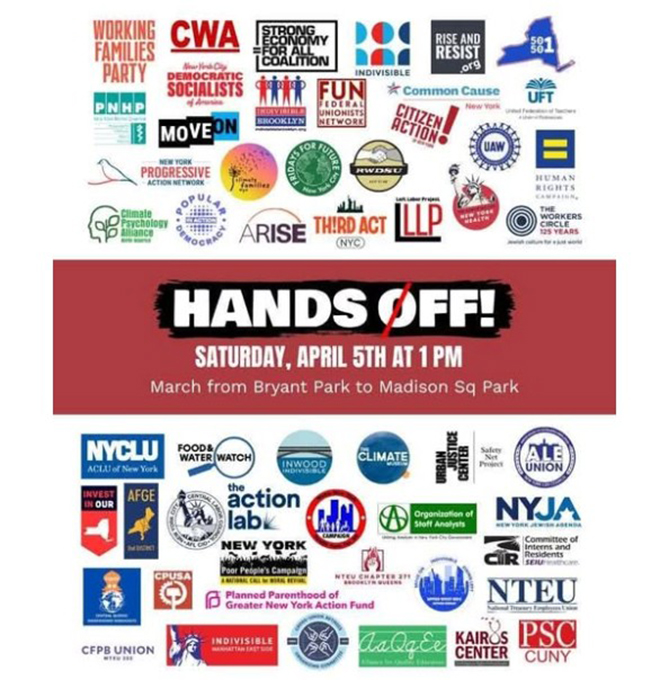
There were a number of union contingents that joined as we marched down Fifth – huge ones from the UFT (United Federation of Teachers) and NYSNA (NY State Nurses Association), the Laborers, CWA, SAG-AFTRA, Musicians. The Central Labor Council endorsed the march. Attached is a poster for the event, put out by the New York Hands Off Committee.
Bottom line people were there, some were able to assemble with their unions, with community groups, but people came out.
Since there were no permits, there were also no speakers.
Anyone could bring whatever signs they wanted.
Here is what one of my neighbors posted on Facebook, which is a damn good summary of the mood of the country:
“This felt to me much more deeply serious and intentional than the typical protest I’ve been to over the years. All two hours were pretty much consumed by gathering and marching–not the usual long-winded, repetitive speechifying (that so often feels like work to listen to) from leaders, would-be leaders, and politicians, that so often consume most of the time, but rather homemade signs, spontaneous chants, our steps, steps, steps, and more steps–and a sense of community with our fellow protestors all across the country.
This was not a one-time thing to make us feel good. This was a promise to keep it up, to do everything we can to save our country.”
Kurt Stand – “#42 was not a DEI hire”, April 5 at the Lincoln Memorial
We knew it would be a good crowd when we got to the Metro – long lines of people buying fare cards – which translated into people coming from outer suburbs to go downtown and attend the rally in D.C.
Between looking at handmade signs, watching people look at their phones to figure out which stop they should get off, it was clear that for many, if not most, going to protests is not something they ordinarily do.
Once we arrived at the Lincoln Memorial, we saw lines of animated people of all ages assembling talking, listening, looking all around (we hooked up with a group from DSA – young, militant, engaged – and happily too seeing old comrades and friends as in days of old). At the Memorial we would go from an open space to a crowded space, with the open space behind us filling up. With people behind us, to the side of us, all around us, it was impossible to estimate the crowd size. Numbers were perhaps not as high compared to some major demonstrations, but that was because this was not a national march; rather it drew from the “DMV” — Washington DC, suburban Maryland, Northern Virginia.
Thus the issues that resonated most were those that are impacting our communities. Federal workers, contractors, grantees were omnipresent as was evident by the signs – including many by scientists. Trans rights, public education, the needs of special needs kids was also a theme for they are the ones being hurt the most by the attempted destruction of the Department of Education. And anger at the attack on democracy has a particular meaning in D.C. as city residents lack (even in good times) basic rights that people in the 50 states take for granted. Speaking of democracy or the lack thereof, another focus was on migrant rights; the illegal deportation to El Salvador of Kilmar Armando Abrego Garcia, a sheet metal worker apprentice and unionist, is a case in point – we had attended a solidarity action at the federal courthouse in Greenbelt the day before. And after the rally on Saturday there was a march to ICE Headquarters that was met by many attending the adjacent Palestinian solidarity demonstration.
Best moment: a guy in a kilt and a bagpipe playing “Foggy Dew” – which fit nicely with the best poster we saw bit later: The answer to Germany 1933 is France 1789.
…
Tomorrow more reports from a few of the 1300 Hands Off! demonstrations around the country
Hands Off! Post 1
By The Editors
April 5 rallies against Trump/Musk nationwide!!
Jack Metzgar – Oak Park, Illinois
While there was a massive protest in Chicago’s Loop, there were impressive smaller ones in more than a dozen suburbs and small Illinois towns. The one in our leafy inner-ring suburb drew more than a thousand. I could not go for health reasons, but my 80-year-old wife reports a varied crowd from kids to seniors filling a public park in our downtown, angry but in high spirits.
Mike Johnston – Watsonville, CA
In Watsonville CA over a thousand people showed up at a rally in the main Plaza for a rally with speakers from the Labor Council, Barrios Unidos, the Day Labor Center and others. It closed with a rousing speech in English and Spanish from Dr. Faris Sabbah, the elected County Superintendent of Education, about growing up under an authoritarian regime in Iraq, reminding those present that all of what we have here was won through a revolution followed by years of struggle, not gifted, and emphasizing the need to unite behind all of the communities that are being attacked to fight back.
Josefa Simkin – Augusta, Maine
About 3,000 people showed up in Augusta, Maine, which has a population of 20,000. They heard from a Palestinian whose family came to the US in 1948 and who is now a US citizen who spoke and quoted history of the Resistance on the island of Mayorca, Spain when Italy’s fascist dictator tried to take over in the 1930’s. He said their motto was: ‘No Pasarán!’. And they won.
Alongside him was a representative from Jewish Voices for Peace, who emphasized that opposing Israel’s war on Palestinians was not anti-semitism. There were also state representatives, people representing trans rights, people representing the perspective of youth, people that were representing the Latino workforce and community that do a lot of labor for the main industries of blueberry picking, lobster industry. It was a chilly 37 degrees which did not dampen the enthusiasm of the crowd.
Ted Cocheau – Santa Cruz, California
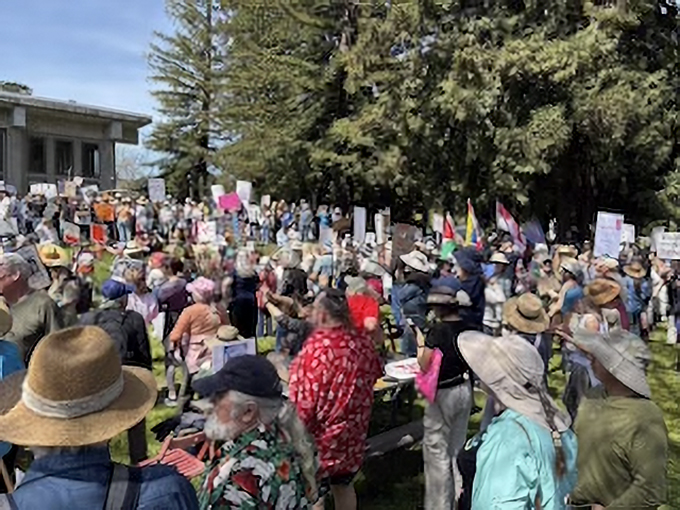
It was a beautiful warm spring day when as many as 5,000 people, most holding creatively derogatory hand-made signs, gathered in front of the Santa Cruz County courthouse at noon. Those who couldn’t fit on the crowded lawn lined up along Water and Ocean streets waving their signs and cheering at the cacophony of horns from passing cars. The crowd was energetic in a happy-mad sort of mood. Happy to be there with a very large crowd of like-minded citizens expressing their outrage, angry about Trump, and his destructive and heartless policies, while also getting after Elon Musk in equal measure. A series of speakers talked loudly into the PA system to be heard over the noisy crowd and the drum banging of none other than Crazy George. The MC got the crowd involved having the crowd loudly yell “Hands OFF! after each of his prompts, including, “What do we want Trump to do with our Social Security? Our Medicare? Our universities? Our libraries? Our scientific research, Our foreign aid? Our allies?…” Most of the crowd stayed for a few hours, happy to be amongst their friends and neighbors with a renewed sense of a moral community, then started drifting off to the parking lots still waving their signs as passing cars honked loudly and feeling happy they had an opportunity to express themselves. One perplexing observation was how few young people participated, especially being in such close proximity to the university, and this same observation was relayed from a friend attending her local rally in Santa Rosa.
Erica Terence – Orleans, California
About 25 Orleans residents assembled in tiny, rural Orleans, California, joining “Hands Off!” protests organized across America and the globe today. Protestors walked across the Orleans bridge to acoustic guitar folk songs, joined by a local dog and cow when they got to the other side!
Peter Olney – San Francisco, California
Civic Center Plaza in San Francisco was filled to overflowing today with demonstrators participating in the “Hands Off!” rally against Trump and Musk. “Hands Off!” is a national coalition resistance effort ofIndivisible, Move OnandThird Act among other forces. The most exciting aspect of this gathering was the creativity and multiplicity of signs and visual artifacts created by individual protestors. My friend Salvo Leonardi from Italy commented that you would not see such variety and creativity in signage in Italy. There would instead be large contingents with organizational – often union – banners and signs. I said that reflected somewhat the weakness of our resistance as we would benefit from tighter and more disciplined participation. I did not see a large and visible contingent for instance from labor although there were many unionists in the crowd. Nevertheless this was a big step!
The “Hands Off!” coalition advertised 11 separate rallies throughout California and many in other states. And “Hands Off!” is only one of many organizations powering the fight back. Keep our marching shoes on as these are only the opening salvos…!!
…
More from “Hands Off” demos around the country Tuesday, Wednesday, Thursday
Onigiri and Shohei Ohtani – A Japanese Sojourn – March 2025
By Peter Olney
This was my second trip to Japan. Christina Perez and I visited first in the fall of 2023 to see our son, Nelson, who lives in Tokyo. The whole month of March 2025 has been devoted to him and taking in more of the country than on our last visit. We went 400 miles north to Aomori, at the northern tip of Honshu, the main island of Japan, where Christina and I discovered the “onsen,” natural hot springs and the bathing facilities around them. I am accustomed to the cold plunge on Ocean Beach in San Francisco, but the onsen provide me with a cold pool and then a very hot bath. Very therapeutic for all the aches and pains of aging parts. I’ll be looking for some Bay Area onsen when I return. We visited the base of Mt. Fuji and returned again to Kyoto, the ancient capital of Japan, but now a city of 1.2 million. The cherry blossoms are starting to bloom, and life is good here at our house in Hino City, one of the many cities that make up the Tokyo metro area of 37 million.
Hino, population 190,000, is not glitzy, and rarely do we see non-Japanese folks in the area around the station where we reside. Hino is the home of Hino Motors, a truck-manufacturing subsidiary of Toyota. The Japanese auto industry and the business press are all abuzz about the stiff 25% tariffs that Trump is about to impose on Japanese autos entering the USA. Toyota is looking a bit foolish as they lavished praise on Trump in the run-up to the election and dutifully donated $1 million to his inauguration. They were motivated by the fact that Trump talked about stopping electric auto mandates. The giant Japanese automaker supported his position because they have bet their future on hybrids—gas and electric-powered vehicles. Trump’s hypocrisy and mendacity are on full display as he has lavished praise on South Korea’s Hyundai for building a $7.6 billion electric vehicle factory in Alabama and specifically exempting them from the auto import tariffs. Ass kissing and ego aggrandizement are the most effective tools for diplomacy with the Donald, and even that may not be enough depending on his latest whims! Tough talk of tariffs and economic nationalism belies the fact that the whole auto industry is international, sourcing parts and production everywhere. And management reflects this. The CEO of Nissan is Mexican, and the CEO of Hyundai is Spanish. Unions would be well advised to shed any domestic loyalties and unite with workers of the world.
Enough of this manufacturing talk. The big story when we arrived and remains so is #17 Shohei Ohtani and the Dodgers. Shohei is everywhere, and the two games between the Dodgers and the Chicago Cubs on March 18-19 were massive sellouts, with bleacher seats retailing up to $900. Both teams are loaded with several Japanese stars, and baseball is omnipresent in Japan. The high school playoffs are televised daily, and the quality is amazing. A high school pitcher throwing 95 MPH!
We had the good fortune to snag seats to see the Yomiuri Giants (the Yankees of Japan) play the Chiba Lotte Marines on March 23 in a preseason game in front of 42,000 at Tokyo Dome. We purposefully sat in the bleacher rooting section for the Giants. The fans are bedecked in Giants hats and shirts and stand and chant the whole home half of the inning when the Giants are up. Each starting player has a specific chant published in the paper program—thank God somewhere in the world there are programs. The ritual at the games is amazing, and we were warned that wearing the colors of the Chiba team in the Giants cheering section would be cause for expulsion!
Shohei is everywhere, advertising clothing, autos, and my favorite—onigiri! Onigiri are a Japanese dish consisting of small balls or triangles of rice stuffed with pickled or salted filling and wrapped in dried seaweed. My son introduced these to me on our first trip, and they have become our breakfast go-to food! We usually pick up our morning onigiri at Seven Eleven, Lawson’s, or Family Mart, three of Japan’s giant convenience store chains that feature fresh-made food daily. In fact, Seven I, the holding company for worldwide Seven Eleven, has rejected a $47 billion takeover offer from Canada’s Alimentation Couche-Tard Co., partly because of an issue of onigiri freshness. Onigiri inventory is turned over daily, and the company maintains a high standard of quality and freshness. Evidently, Couche-Tard doesn’t share that concern and is willing to cycle inventory over two days. This is somewhat emblematic of the riddle of Japanese society—robust capitalism coupled with certain societal values. Always good to remember that the CEO-to-worker pay ratio in Japan is 12-1, versus the US at 300-1. This is not principally driven by a powerful left labor movement redistributing income downward but by certain societal norms and customs.
If you are outraged about Trump and Musk and their daily attacks, being here in Japan is almost soothing. The big political scandal generating the most front-page ink is the fact that Prime Minister Shigeru Ishiba gifted $700 each to 15 members of his own ruling Liberal Democratic Party. This was his own money, but it is seen as an ethical violation that might bring his government down! The other thread I have followed is the debate over gender equality. Japan is the lowest ranking of the G-7 countries for gender equality. The debate in Japan has arisen over attempts to change the marriage surname law, which requires both spouses to use the same name, and that has usually meant choosing the male surname.
Healthcare, universal or not, is always a measure of societal progress. The Japanese Constitution expressly declares that citizens have a right to healthcare, and that it is the state’s responsibility to ensure that right can be realized. The government’s commitment to healthcare for all led to universal health coverage in 1961. Free access is guaranteed, and Japan was the first country in the world to establish a systematic long-term care insurance system. I had a bum knee in Japan. Years of football, jogging, and other exertions came home to roost with an aching right knee aggravated by carrying luggage. I went to see an orthopedic doctor at a clinic in Kichijoji. He is the brother-in-law of a friend of ours who we met in the US. He is a top-flight bone doctor who was the team physician for the Japanese Olympic Mogul ski team for the Salt Lake 2002 games!
The visit was fast and efficient. The doctor ordered x-rays immediately. He examined the rays and recommended the injection of hyaluronic acid for joint lubrication. I had never heard of this treatment, but I went for it. Days later, and with the assistance of hot baths, the knee is doing much better. But what was more impressive was how my pocketbook was doing after the visit. I am a foreigner without Japanese national insurance, and I paid $80 for the whole visit. There is civilization beyond the borders of the highly privatized, rapacious healthcare system of the US. No Luigi Mangione here!
On my first visit in 2023, I did a training on internal union organizing for Zenroren, the second-largest national trade union federation with over 700,000 members in their affiliated unions. At the invitation of Assistant National Secretary for External Affairs, Keisuke Fuse, I spoke this time on Labor under Trump or Labor Building Power and Overcoming Trump. We did the talk at the headquarters of Zenkyo, the All Japan Teachers and Staff Union, a Zenroren affiliate. There was a national Zoom hookup. The meeting was ably chaired by Zenroren National Secretary Kurosawa.
My talk was on March 21; a few days after the wage settlements under “Shunto” were announced. Shunto is the Japanese term usually translated as “spring wage offensive.” It was first carried out in 1954 in response to the company-by-company or “enterprise” unionism that made unions reluctant to strike one firm for fear that other companies would snap up market share. Therefore, the unions agreed on one date to potentially strike if their demands were not met. The Shunto has evolved into a largely ritualistic push without the real threat of national strikes. I went to a small but spirited Zenroren rally in front of NTT (Japanese Tel and Tel). Soon after, I was astounded to read in the newspaper that Toyota, for instance, agreed to meet the union’s full wage requests, and some major corporations gave raises higher than demanded by the unions. A seemingly bizarre twist, although I remember when certain grocery employers in the USA gave higher wages than the United Food and Commercial Workers (UFCW) contract called for in order to attract personnel in a tight labor market.
I have spent a lot of time in Italy over the last 54 years and Christina and I like to settle into our neighborhood in San Frediano, Florence for a few months each year. Japan seems to be pretty intrigued by Italy also. There are tons of Italian restaurants with mediocre food, but besides the embassy the Italians have a large Cultural Center opposite the gardens of the Imperial Palace. Our friend Giacomo Benvenuti of Florence spent 10 days with us at the tail end of our month in Tokyo. He took us to the Ghibli Museum which is dedicated to the work of Studio Ghibli, the producer of many animated films that are renowned around the world: My Neighbor Tortoro and Princes Mononoke and The Boy and the Heron. Ghibli is an Italian word meaning a hot dust, bearing wind from the North African desert. It is derived from the Libyan Arabic word “gibli” meaning south wind. Studio Ghibli’s legendary director Hayao Miyazaki adopted the name for his studio because he felt the need for inspiration from a hot wind. The Museum is an experience unlike any other museum that I have visited and Miyazaki is quite an amazing figure, very prolific and very much involved in the peace movement. He has won 2 Academy Awards for Best Animated Feature films and in 2001 he boycotted the Academy Awards because in his words: “The reason I wasn’t here for the Academy Award is because I didn’t want to visit a country that was bombing Iraq.” Giacomo further observed that, “Even if Japan ranks low in gender equality, their animated films portrayed strong, independent heroines (already from the 80s). They were able to combine this sort of new and controversial idea with a narrative exalting at the same time the old pre-capitalist traditional culture, particularly the Shinto deep search for equilibrium.”
There is lots more to reflect on about Japanese customs and politics, and I was hoping for a final meet-up with Attorney Suga Shunjii, who is spearheading a Japanese legal assault on the phony Amazon Independent Contractor (IC) model—winning Workers’ Compensation claims for injured IC drivers at Amazon in Japan. Speaking of phony ICs, Uber is not legal in Japan, but you can use the very efficient and reliable Uber app to request taxis. And we did!
So, while we ate well and enjoyed our time with our son and the onsen baths, I couldn’t help myself—it was a busman’s holiday after all!!!
…
A Lesson From Argentina’s Dirty War for Today
By Jay Schaffner
When my father immigrated to the United States when he was fourteen, his older sister was not allowed passage as part of the family visa, since in the year in that took to issue, she had gotten married. Anna and her husband Efraim were in a quandary. The year was 1921. The family were refugees from the Ukraine, which had been part of the old Russian empire. Efraim had been a conscript in the Czar’s army, from which he deserted, and now was wanted by the White Russians. He was then in the Red Army and in the Ukraine in 1921, he did not think there was any hope for the Red Army, so he also deserted.
Anna and Efraim boarded a ship in London for Buenos Aires, Argentina. My father would not see his sister for 54 years. During the period of Argentina’s Dirty War in the 1970s, when Argentina suffered under a murderous fascist dictatorship, my father and uncle convinced Anna to come to the United States. The first time they saw each other in 54 years. (Efraim had died a few years before.) They had written one another, about the weather, about their work, their families, nothing else, all in Yiddish. My father living under McCarthyism, fearing deportation because he was a naturalized citizen; Anna living under Peron and Peronism. They never expressed their views of the government.
Surprise, surprise, when they met after 54 years, they found that they were both members of the Communist Party in their respective countries. Anna was here two years, then she decided she was going back. She was confident that she would be OK. She lived another few years – the junta never came for her.
Years later Judith and I were in Buenos Aires. We went to Memorial Park, the monument dedicated to the 30,000 who were perished by the junta during the Dirty War. There were seven panels, for each of the seven years, organized alphabetically, with people’s ages. Nearly everyone was in their 20s, early 30s or a teenager. Anna was right, they left people her age alone.
My message – Those of us boomers – We have a vital role to play in organizing and fighting the MAGites march to fascism.
April 5, 2025 – Hands Off! – Remove, Reverse, Reclaim!
Remove Corrupt Politicians from Office
Reverse the Damage
Reclaim Our Democracy
One thousand local actions in every state, in every state capital, in large cities, in small cities and towns, organized by hundreds of local organizations and private citizens. Called to action by Indivisible, 50501 Movement and the Women’s March, and endorsed by more than 150 national and regional organizations.
Organizations as diverse as the AFT, NEA, PSC CUNY, SEIU, CWA, UAW, Greenpeace, Roots Action, Color of Change, Stand Up for Science, Consumer Federation of America, League of Women Voters answered the call; as did MoveOn, Working Families Party, Our Revolution, and Third Act.
For more information and to register for a local event, click here.
…
How do we defeat the fascists? My Best Guess
By Fred Glass
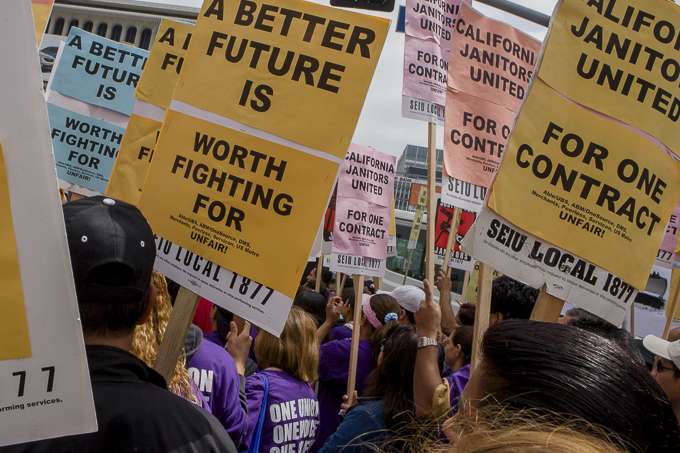
I’m sure you’ve had the same conversation by now. A friend, family member or near-stranger calls and says, “Talk me down. I’m freaking out.”
I fielded two of these recently. The first caller, an old friend and comrade, is not a newbie. After a couple decades on the left, during which she was an activist in a teachers’ union and leader in various union campaigns, she upped her game, getting herself successively elected as a school board member, City Council member and finally County Superintendent of Public Instruction, overseeing seventeen school districts. She served two terms, staying faithful to the progressive ideals she started with.
After retiring she joined DSA and continued to stay active in electoral politics in a support role. In short, she is not naïve or easily rattled. But on this occasion, she was feeling completely unnerved and overwhelmed. Why? By paying too much attention to the news, chock full of horrifying stories about Trump, Musk, Vance, and the other elected and unelected fascists in their ugly campaign to destroy the helping powers of government and make life for the multiracial working class as miserable as possible.
She called because she was looking for human connection with a comrade whom she hoped could point to some rays of light amid the darkness. I told her that many people are resisting the fascist tide in many ways—in the courts, in all levels of government, and in the streets. New coalitions are being formed, and old ones resurrected. I mentioned the popup demonstration staged by FUN (the new federal workers network California Red reported on last issue) that I had attended.
I told her the mainstream media is certainly not helping here. Its underreporting of the resistance is spotty, often politically unsophisticated, and fearful of taking on Trump. If you pay too much attention to it, it will freak you out and/or wear you down quickly—part of the goal of a fascist regime. She got off the call telling me that she felt a bit better, and promised she would more carefully titrate her media consumption going forward.
In the middle of the call I saw my brother was trying to reach me, so I called him back—and found myself essentially returned to the same conversation, complicated by where he lives, a small conservative rural town. He said analogies with history (Germany 1933) were making him extremely nervous.
“… this part of the strategy requires state and local work around election protection, as well as a candidate selection process”
In both conversations (and others like them) I gave two pieces of advice: watch your political media intake carefully, and find a group of like-minded people with a common resistance perspective and shared activity to join with—being careful to take on only the amount of work that won’t burn you out over the long term. It also helps to have a best guess big picture to work with.
Best guess: Three lines of defense
I—and I’m not the only one—see three lines of defense and broad areas of activity between now and the 2026 elections (if we are still having them by then). The first, a focus on the courts, leaves out most of us for strategy discussion and direct participation, as legal action mostly requires being a lawyer. But we can certainly participate in support campaigns, including publicity, education and organizing. Since the highest court in the land is in the hands of Trump appointees, this first line of defense may only get us so far, with its main utility buying time. It may ultimately be more effective for education of the public than actual legal redress—especially if the fascists choose to ignore and sideline the courts. For what it’s worth we note that of the eighty suits filed against Trump he has won 12 and lost 22.
The second front is electoral—organize to overturn the thin majorities of Republicans (now a fully fascist party) in the House and Senate. It is critical that at least one house of Congress goes to the Democrats in order to block the worst actions of the trifecta held by Trump et. al. At this point there is no guarantee that there will be elections in 2026, or if there are, that they will be conducted fairly. So this part of the strategy requires state and local work around election protection, as well as a candidate selection process that makes certain no Trojan horses like Manchin or Sinema are among the Democrats running, and replacement of weak straws like Schumer among the current leadership. Then, of course, there’s actually electing candidates in 2026.
“… the final line of defense before full on dictatorship will be mass action. What might that look like?”
Alongside these two frontline areas it will be crucial to construct robust non-violent direct action (NVDA) wings of our movement. Sit-ins, marches, occupations, other forms of civil disobedience and face to face confrontations against the people moving the country to dictatorship will gain news coverage and, with successes, provide information and courage for the long term. Such activities will bring in new recruits. (They will also require savvy and well-prepared security. Depending on how things unfold the MAGA forces might well unleash their violent rabble on peaceful demonstrations.)
There is at best a two-year shelf life on these two lines of defense, which is why development of street support for them is so critical; the latter will likely become the key component of what follows. If lines one and two crumble the final line of defense before full on dictatorship will be mass action. What might that look like?
Here is where unions come into the center of the picture, and we must begin preparing now if there is to be any chance of success. Maximum impact on this far right government and oligarchy (which since January have become synonymous) will be earned when masses of workers refuse to work. The more that the consent of we the governed is withdrawn from the abuse we are suffering, the more leverage we will have.
Forward toward the…
I have never been one of those people who think it’s a good idea to call for a general strike to deal with a problem, even if the problem—say, the United States going to war under false pretenses—would deserve to be met with that solution. Why not? Because there are sound reasons why we’ve only seen around fifteen (depending on how you define them) citywide general strikes in nearly two hundred and fifty years of American history, and none since 1946. We’ve had exactly one national general strike, in 1886, which after achieving only limited success toward its goal of an eight-hour workday, brought on the first Red Scare.
Called by the young American Federation of Labor (AFL) and supported by large sections of the Knights of Labor on May 1, 1886, the strike was honored by some three hundred thousand workers (in a non-agricultural workforce of around twelve million). It eventuated over a period of years the establishment of International Workers Day on May 1 in nearly one hundred countries around the world, but not here, the country in which the events occurred that inspired the holiday. In the wake of that setback, the eight-hour day movement had to wait nearly half a century before it became the law of the land.
This historical record might not encourage hope for a general strike’s success today. Neither does the current state of organized labor, which is weaker in terms of workforce density than it has been in a century, and contrary to what is required for a general strike, fractured along several fault lines.
Don’t call: organize
But recent developments mean the political landscape is shifting. Many strikes erupted in 2022, the most important of which was the autoworkers’ victory over the Big 3. In its wake the UAW’s president Shawn Fain issued a challenge to the rest of the labor movement: line up your contract expiration dates for May 1, 2028 and prepare to act the way a united working class should act. No leader of a major national union has talked—concretely—like this for decades.
Although we have seen no citywide general strikes since 1946, in 2018 the “red state revolt” of education workers featured anti-austerity walkouts that in their scale were essentially general strikes of public education. Currently in California a number of major urban teacher unions have been meeting and planning to bring these ideas together: a common contract expiration date and united action when the contracts expire.
When Trump’s Department of Homeland Security announced earlier this month that it was cancelling TSA workers’ collective bargaining rights, Sara Nelson, head of the Association of Flight Attendants, responded that workers have “very few options but to join together to organize for a general strike”.
The wording is precise: not a call, abstractly, for a general strike, but to organize for one. This was the beauty of Fain’s call. Embedded in how he issued the call was how to make it happen. Even so, it will take a massive effort to pull it off. The plan was presented before Trump’s election with a three-and-a-half-year timeline—appropriate for scaling up this way. But given the speed at which the fascists are breaking government and completing their coup, we will probably need to move up the schedule. Is that possible?
“… unity of the forces of resistance to fascism and oligarchy is created by coalition building and …”
An extraordinary event, a general strike takes a rare combination of circumstances to bring it about, let alone win. Four preconditions are required: widespread anger among working people; a high degree of cooperation in a strong enough labor movement; union leaders confident enough in their level of organization that they are willing to stick their necks out and call for it to happen; and a spark or symbolic incident that crystallizes people’s willingness to act.
In light of the relatively small size of the labor movement today, coalition with other progressive organizations is crucial: finding common cause with community organizations representing working class, poor and otherwise marginalized constituencies, with international solidarity and anti-war movements, with NGOs of all types, will be important.
It is likely that building block actions will contribute along the way—sectoral strikes, demonstrations and occupations, with (best outcome) growing solidarity and tactical sophistication developing through successes and failures. Labor leaders will need to be convinced through this process that militancy is a practical matter. This will no doubt not be a linear process; more like a chaotic one, the lessons of which need to be considered on the fly, tested and retested. A general strike—the ultimate weapon of the working class—will result from intent, experience, reflection and a bit of luck.
Attitude counts
That’s as far as my best guess can take us. I’ll close by emphasizing that unity of the forces of resistance to fascism and oligarchy is created by coalition building and enabled by an attitude not always present in the culture of the left. We are far too prone to being alert to openings to argue, to disagree, split, stay in silos, and allow purity of principle to keep us divided. This is especially the case within organized labor. Seeking differences is relatively easy. We are less used to (and less good at) seeking openings to find our common interests and purpose and then acting together as one. But without that attitude of openness and unity-seeking, coalition building becomes far more difficult.
Fighting fascism is not a time and place for purity, single-issue politics or doing things the way we’ve always done them. It’s a time to set aside the narrow lens for a broad one. By all means continue to work on your social justice cause, the one that you have passionately cared about and pursued for years or decades, whatever that may be. But don’t let that divert you from the task of standing with others in the alliances that are now forming to build the strength necessary to defeat Trump, Musk and their fascist assault. We’re in this together or we’re not going to make it.
…
These are not the polite petitions of victims pleading for a softer repression
By David Bacon
It’s been a few months since Donald Trump took power, after running a campaign soaked in anti-immigrant tirades and threats of mass deportation. The media have concentrated on these threats, but even progressive outlets paid little attention to the responses of the communities threatened. Yet marches and demonstrations have been widespread in Mexican communities.
These protests often take place not in urban centers, which typically receive more media attention, but in the Mexican barrios of the urban fringe. San Mateo is one – on the San Francisco Peninsula south of the city. Fort Bragg is another – a former mill and fishing town three hours north of San Francisco, where Mexican children are a majority in the small city’s schools.
” … demanding recognition as an essential people, belonging to this country’s fabric.
These are not the polite petitions of victims pleading for a softer repression. They are angry protests – people are out in the streets, not cowering behind closed doors. They carry signs with denunciations that declare “MAGA: Mexicans Ain’t Going Anywhere!” or “I drink my horchata warm because Fuck ICE!”
Young Mexican women – some born here, some who came as children, and others who just arrived – carry U.S. flags, not out of false patriotism, but demanding recognition as an essential people, belonging to this country’s fabric. The many, many Mexican flags have important meaning, and are no longer controversial as they were in the big marches of 2006. They speak of pride in Mexico as a country with a progressive government, in contrast to our reactionary one. They demand that the Mexican presence in this country be recognized as well, with rights and respect for Mexican people.
Not all the flags are Mexican or U.S., Hondurans carry their own, as do Salvadorans and Guatemalans. Some marchers wave the Philippines’ flag with a similar message – recognition for a community with a century’s history, starting with the imperial war that made their homeland a U.S. colony.
These marches with their flags and signs are harbingers of change. They’re not yet as large as the protests that took place in 2006, with its millions in the streets. But they are growing. They are overwhelmingly organized and led by young people and women, and they deserve recognition.
The benefit of organized resistance goes beyond fighting immigration raids. The movements of immigrant workers, their families and their communities have historically fought for deeper social change, beyond deportation defense. They’ve shown great persistence and strategic vision, as they fought threats of deportation while imagining a future of greater equality, working-class rights and social solidarity. That vision is as necessary to defeating repression as action in the streets.
In the flow of people crossing the border, “we see our families and coworkers, while this system only sees money,” says Rene Saucedo, an organizer for the Northern California Coalition for Just Immigration Reform, a grassroots immigrant rights organization that has organized marches and demonstrations supporting the Registry Bill. “So we have to fight for what we really need, and not just what we don’t want.”
Marchers carried signs promoting an alternative to deportation, the Registry Bill, HR 1511. This proposal would open legal status to an estimated 8 million people by allowing undocumented immigrants to apply for legal permanent residence. Some of the anti-deportation marchers were veterans of earlier marches last year and the year before, demanding the passage of this bill.
Stepping out is the precondition for mobilizing the support of a broader progressive community behind these protests. The photographs here can’t possibly encompass all the marches or show every aspect of them. Their purpose is to make visible the crucial role of the Mexican community in inspiring a fightback to Trump fascism across the board. They show who’s out there organizing and leading it. Their picket signs and flags graphically present their demands.
Because the new Trump regime is seizing the country’s databases, and has sophisticated tools to track those it targets, there are no individual captions for these photographs and no naming of the individuals in them. They were taken in San Mateo and Fort Bragg, California.
…
Silicon Psychos and Pseudo-Proletarians
By Jeff Crosby
The battle brewing inside Trump’s fascist clown car
Trump’s for daylight savings. Trump’s against daylight savings. Trump’s against mail ballots. Trump’s for mail ballots. Trump’s against Electric Vehicles. Trump’s for Electric Vehicles. Trump’s for ending abortion. Trump’s for leaving it to the states. Trump created a beautiful vaccine. Trump’s against vaccines.
His Department of Government Efficiency (nicknamed by a clever wag Department of Oligarchs Getting Everything) will immediately trim 3 trillion dollars from the federal budget…or maybe 2 trillion, or maybe half a billion, which, by the way, would involve cutting student loans, Medicaid, food stamps, and federal workers’ pay. And oh yeah maybe some waste and fraud, too.
Some of this is just Trump’s endless whining. But it’s more than this, and it is important to understand how fascism ascends and maintains power: through spectacle, not policy. Nothing Trump commits to as a matter of policy means a damn thing, and never will—other than the goal of consolidation of capital and power in the search of profits.
Like totalitarians everywhere, Trump has systematically undermined the independence of the courts through intimidation and packing them with sycophants. Like all fascists, he bullies and humiliates the legislative branch of government, with the goal of making it irrelevant. He will threaten and even jail elements of the press who expose his and his cronies profiteering and personal degeneracy.
Bloodsuckers and Criminals
But layered over the consolidation of power and repression of popular movements is obfuscation, constant chaos, and a revolving clown show of bloodsuckers and criminals, clamoring for attention and favor.
Those of us who grew up watching war movies of goose-stepping Nazi soldiers and old newsreels of tens of thousands of Germans screaming for the blood of the Jews may still think of fascist movements as a unitary, disciplined social phenomena. Everyone is blond and square-jawed (at least the boys).
But fascist movements are not like that. David Broder in his book Mussolini’s Grandchildren delineates the conflicting trends in Italian Fascism, then and now: “eclectic ideological references, strategic outlooks and forms of activity, not to mention local particularities.” These include skinhead soccer thugs, anti-LBGTQ and anti-abortion fanatics, traditional anti-Semites, and even left fascists (or “roast-beef Nazis”) who wanted to socialize the means of production (lifted from Marx), and those who promoted an anti-neoliberal “communitarian” economic model.
Hitler’s murderous assault on his loyal SA stormtrooper brownshirts and other factions of the Nazi party in 1934 was another example: the Night of the Long Knives, which assassinated scores of Nazi leaders and arrested perhaps a thousand. The SA was useful to battle communists in the streets, but entertained notions of a redistribution of wealth, and had to be brought to heel so Hitler could consolidate the Prussian elites of the German military.
Musk and Bannon: Silicon Psychos and Pseudo-Proletarians
Some of the factional battles of the fascist swamp creatures do actually matter, not so much as policy disputes but as conflicts between elements of the fascist social base. At some point some choices may need to be made.
In the main ring, the bell sounds and the Silicon Psychos circle the Pseudo-Proletarians.
Musk and his crew are beyond what Minnesota Governor Walz called “weird”; they have moved on to bizarre. They truly believe they are an intellectual and even physical elite, a race above the rest of us, as coded in their DNA. Musk, with 11 or 12 or maybe 13 children by three wives and other blessed recipients of that DNA, uses them as props in the Oval Office, and has been described by a daughter as “cold,” “uncaring,” and “narcissistic.” He has been described by friends (and Bannon) as a sociopath, and as a “transhuman,” that is, someone who has the goal of “eternal life,”—in a physical, not spiritual sense. His co-parents have begged him to pay just a tiny bit of help and attention to his spawn.
Having survived as a failed businessman off of California state subsidies to rescue Tesla, he moved on to $38 billion dollars of government contracts. His DOGE crew dismantles anything that might regulate his brilliance. As someone who has run typical corporate dictatorships, he applies the same blunt force trauma to government, and his super-race self to governance, and revels in the glorious cruelty of it all.
One of my children lost employment this year due to a corporate buy-out and was given 36 hours to accept a new job with no idea of the responsibilities of benefits that came with that offer. Jack Welch, the former CEO of General Electric where I worked for decades, bragged about firing the “low performing” 10% of his employees every year. This is what it means to “run the government like a business,” with all its cruelty and yes, inefficiencies. Make the government a plaything of dictators, without regard to merit.
In the other corner are the Pseudo Proletarians led by Steve Bannon. Bannon is like the HR people who sit across from the union and tell you again and again about how they came from ten generations of coal miners. He neglects to mention his time at Goldman Sachs, and believes that you look a lot more working class if you haven’t showered in a month. He stole from a phony fund to which some willing fools donated their hard-earned dollars to build a border wall–which makes him a convicted criminal alongside Trump.
Musk bought his influence with $270 million of campaign lies about immigrants and trans folks, who have apparently moved a notch above gays and lesbians as a mortal threat to the workers. That’s the kind of moral exchange that Trump understands and is unlikely to want to jettison. Besides, Trump just gets off on power and money. In the short run, Musk will do untold damage. But Musk also has already become a lighting rod for resistance. People are actually more interested in counseling and health care for veterans and Medicaid, than in sending a billionaire on a tourist trip to Mars.
Bannon, on the other hand, represents an Ivy League cohort with an actual strategy to gain and maintain power and wealth. His blue-collar bullshit, along with that of his less clever co-thinkers like Senator Josh Hawley of Missouri and the clumsy Vice President Vance, will have more staying power. Hawley has even earned nervous criticism from the anti-union rat contractors Association of Building Contractors and the Right to Work Foundation for supporting things like mandatory contract arbitration. If you underestimate this, you have not listened to Bannon rant about “capitalists who always try to suppress wages.” He is harder on billionaires than most Democrats.
If, as I have argued before, the fight against fascism is essentially a fight for the working class, Bannon is the bigger problem.
Even for a sociopath like Musk, with zero capacity for self-reflection, attacking “capitalists” would be a bit of a stretch. If, as I have argued before, the fight against fascism is essentially a fight for the working class, Bannon is the bigger problem. Although Trump won the popular vote by 1.2% he acts as though he won with 90% of the vote. To consolidate sustainable control, he will need a strong social base in the working class majority. And resistance to Trump from more elite sections of society, from the other Tech Bros to the Washington Post to the ephemeral reasonable Republicans, has collapsed. Bannon offers a path to this working class base–Musk does not.
I am using here a broad and I think accurate definition of the working class as defined by “power–power at work and power in the larger society, rooted in our role in the production of goods and services, “in terms of relations to others.” Michael Zweig, in his definitive book The Working Class Majority: America’s Best Kept Secret, figures this comes to about 62% of us, despite all the changes in the types of work people do.
On Friday nights, if I am not busy with essential activities like going to a meeting or hanging out on the couch with my wife watching reruns of “Homicide” or “Call the Midwife,” I catch a beer with an old friend and fellow union guy named Fuzzy at a local bar, the Lido. We review the state of the world and get ready for the next round. “All Trump cares about is money,” says the Friday night Muse. “None of the rest of it means anything.”
Fuzzy is right, or maybe it’s money and the power that brings more money. The throughline beneath the Trump royal court conflicts, both serious and ridiculous, is power and money, and various strands of virulent white supremacy and patriarchy that will get them there. All the rest is fluff and distraction.
The good news is there is a united front building which can defeat the Silicon Psychos and the Pseudo Proletarians both. But that is for another column.
…
Originally ran on Liberation Road Notes
Where’s The Heat, Where’s The Hammer
By Peter Olney
Worker-led and initiated organizing is certainly positive, but this emphasis is one piece of a much larger analytical framework for success in organizing.
A review of: We Are the Union: How Worker-to-Worker Organizing Is Revitalizing Labor and Winning Big, by Eric Blanc (University of California Press, 2025)
We owe a debt of gratitude to Eric Blanc for his new book We Are the Union, and for his continuing outspoken activism in support of labor organizing. His earlier work, Red State Revolt: The Teachers’ Strike Wave and Working-Class Politics (Verso Press, 2019) documented the 2018 upsurges in West Virginia, Arizona, and Oklahoma. Those battles, and the book itself, brought a breath of fresh air during the first Trump administration. Now Blanc joins a pantheon of other prognosticators who must grapple with what union revival looks like in the second and more ominous Trump administration.
In We Are the Union, Blanc draws on his 2018 experiences, as well as his observations of graduate student organizing, unionizing at Starbucks and other retail outlets, the organizing that revitalized The NewsGuild (CWA), and the 2022 surprise victory at the Staten Island Amazon Fulfillment Center. These led him to some broad conclusions for our movement:
“Let me be as clear as possible: this book’s argument is not that resources and staff are unimportant. It’s that they need to be deployed in a way that’s scalable. In other words, unionizing millions will require the absolute increase in staffing and financial support for organizing, but a relative decrease in the staffing density of most campaigns.” (p. 19)
In Chapter 3, Blanc presents some illustrative case studies of successful worker-led and -driven campaigns. The independent organizing drive at Burgerville brought five stores in the Pacific Northwest fast food chain into the Burgerville Workers Union, an affiliate of the Industrial Workers of the World. The Colectivo Collective organized coffee shops in the Wisconsin/Illinois area with help from the International Brotherhood of Electrical workers (IBEW), a traditional building trades craft union; they won their elections and joined IBEW locals.
The News Guild is a division of the Communications Workers of America. For many years the Guild has run an impressive Member Organizing Program that relies on the talent, outreach and passion of existing members to organize new members. All of these examples illustrate Blanc’s point that staffing ratios, while not unimportant, are not determinative. More staff does not guarantee victory: the involvement and initiative of workers themselves is key. And of course in the case of Colectivo and the Guild organizing, union leaders’ recognizing that fact and supporting worker-led organizing led to impressive victories.
To further bolster his argument for worker-to-worker or, in some cases, “do it yourself” unionism, Blanc describes changes in the terrain since the 1930s when labor experienced its modern upsurge in the US. Manufacturing is a smaller sector of working- class employment and logistics, while important, also does not occupy a huge percentage of the workforce. People don’t live near their workplaces, as they used to: there’s a lack of geographic concentrations in communities surrounding employment.
What gives workers power?
No sooner had I finished the last chapter in We Are the Union than I heard the results of the NLRB election at an Amazon fulfillment center in Garner, North Carolina. Carolina Amazonians United for Solidarity and Employment (CAUSE), an independent community- based union, suffered a defeat: 829 workers voted for the union, 2447 against. This lopsided result was not unexpected and does not negate the excellent work done by CAUSE and the prospects for Amazon organizing, but it does shed some light on the limitation of the thesis that is the subtitle of the book, “How Worker-to-Worker Organizing Is Revitalizing Labor and Winning Big.”
Blanc correctly criticizes a formulaic and stilted staff drive approach to organizing, and proposes that “unlike the staff-heavy, 1 (staff) to 100 (worker) model defended above, only worker-to-worker unionism can leverage union resources in a way capable of scaling up working class power.” (page 63) But this observation is hardly revolutionary or at odds with most of the historic practice of organizing. My experience from over 50 years of organizing in venues from manufacturing and warehousing to janitorial confirms that a staff-intensive approach, while helpful, is not determinative.
But winning an organizing drive and getting to a contract does require “heat and hammer.” Workers must have a deep sense that something is wrong, and organizers—whether they be co-workers or union staff—need to be able to inspire and motivate workers to take action to address it. That’s the heat. The hammer is the source of power that will compel an employer to accede to worker demands; it can be the workers’ own collective actions, corporate leverage, labor and community solidarity, or some combination of these. With an understanding of “heat and hammer” in place, other considerations play an important role in successful organizing:
-Committee-building and staff expertise
An effective committee of workers takes leadership of the drive with skillful guidance from union staff. Such “skillful” guidance can often be deferring to the collective wisdom of workers—or being willing to challenge workers based on staff experience.
-Existing density or workplace power
A high percentage of the industry is unionized or the unionizing workers are linked to sectors and seams that are unionized.
-Community bases – subjective social dynamite
Workers are rooted in communities, often communities of color, with common histories and common language, and those communities have their backs.
While Blanc recognizes the power of a reformed United Auto Workers (UAW) and the dynamic “stand-up strike” conducted in fall 2023, he diminishes the importance of manufacturing and especially heavy manufacturing to building power for working people. The stand-up strike rocked the country precisely because it was in a key manufacturing sector in the second-largest manufacturing nation (after China) in the world. In 1955 there were half a million manufacturing jobs south of 57th Street in Manhattan, so radicals and intellectuals were much attuned to that sector. Now much of manufacturing has shifted out of the Midwest and Northeast and to the Southwest and Southeast. So social being determines social consciousness, and many on the Left do not see the continuing power and importance of manufacturing; it represents a smaller percentage of the workforce but is still key to power. When GM CEO Mary Barra cried to the media about the damage that the strike was doing and whined that her massive pay boosts are tied to performance, it was a clear sign the workers were rocking capitalism.
Logistics too remains key to working class power. Witness Donald Trump pandering to the International Longshoremen’s Association in their 2024 dispute with their largely foreign-based employers. Organized logistics workers have the power to choke off commerce and win significant concessions from capital. These sectors have far more impact on capital than workers organizing in most of the sectors that Blanc discusses. Certainly the organizing of grad students is impressive and important but these campaigns most often don’t confront the scorched-earth resistance of Amazon and its notorious union-busting law firm Littler Mendelsohn in Garner, North Carolina. “Amazon, implacably hostile to worker power, brought its full arsenal of union busting to RDU1,” veteran organizer and strategist Jonathan Rosenblum wrote in The Nation:
“After the union filed for an election last December, Amazon began staging around-the-clock anti-union meetings—brainwashing sessions, in which company lawyers and managers threatened workers with loss of their already-meager benefits, characterized bargaining as a futile process, and engaged in character assassination of CAUSE leaders. Amazon played the race and xenophobia cards to split the workforce: Managers told Latino workers that the union was just for Black workers, and they cynically highlighted the Trump deportation machine to further intimidate immigrant workers, who constitute a quarter or more of the RDU1 workforce.
“Managers roamed the warehouse floor and singled out union supporters for harassment. In break rooms, CAUSE organizers reported, the company played “Vote No” videos on a continuous loop. They posted huge “Vote No” banners throughout the workplace. Anti-union literature was plastered everywhere, even in the bathroom stalls, while pro-union literature was promptly taken down. In the week leading up to the vote, Amazon erected fencing around the warehouse, posted security guards, and even arrested an Amazon worker—a union leader from the JFK8 facility in Staten Island, New York, who had come down to North Carolina to campaign with CAUSE.”
Defeating this kind of anti-worker offensive from one of the largest companies in the history of capitalism will require the marshaling of multiple unions, community forces, friendly politicians, the power of solidarity links in the supply chain and of course the grit and imagination of the workers themselves.
Community is more than geography
Blanc’s equating geographic concentration with community misses the tremendous power of communities of color in organizing if they are properly tapped by culturally and linguistically competent organizers. The Justice for Janitors campaign in Los Angeles, which resulted in a gain of 6,000 new members for the Service Employees International Union, was fueled and powered by a largely Central American and Mexican workforce spread geographically throughout the LA basin. The 1992 drywall carpenters’ strike, which paralyzed the residential construction industry from Santa Barbara to San Diego, was led and organized by immigrants principally from one village in Guanajuato, Mexico. The epic battle resulted in 3,000 new workers joining the Carpenters Union. The concept of community needs to be imagined and therefore acted on far beyond the factory towns of the 1930s.
Find the hammer
The organizing at Starbucks and Amazon raises the question of what hammer will compel an employer to make real concessions. Indeed, the baristas have done some wonderful DIY organizing in spreading their movement through coordinated strikes and site-by-site National Labor Relations Board election victories at 500 out of Starbucks’ 9,000 outlets. But despite Starbucks’ willingness to sit down and negotiate, there is no deal in sight. What are the power points in the Starbucks operation that might help the workers get contracts? Perhaps the warehousing and storage facilities in key ports of entry for coffee beans in the US? Are there warehouses that house the trademark Starbucks merchandise? Where is the hammer and how can it be utilized?
Similarly, have Amazon’s choke points been identified and targeted? Could the inbound cross-docks that receive fully laden containers of imported Amazon merchandise be sensitive spots for labor action that might serve to leverage the whole production system? Again there are no easy answers, but union staff can complement and enhance workers’ organizing by doing the research necessary to identify these vulnerabilities and act on them.
Today only 6% of workers in the private sector in the US belong to unions. In 1955 this figure—the union density—was 35%. Yet and still there is power in certain sectors where union density is high, particularly in port, rail, air, and trucking. It takes money to make money: having density in certain sectors and having an organized and committed workforce can lead to victories in non-union sectors.
A forgotten variable in the dramatic Justice For Janitors victory in Los Angeles is the fact the union had control of the janitorial market in New York, Chicago, and San Francisco, and had contracts with the same employers who were operating double-breasted non-union in Los Angeles. When the dramatic strike happened in June 1990 and the police brutally repressed a march in Century City, the carnage led SEIU leaders to threaten strikes in the major organized markets. So where we have power we need to organize and apply it to win in non-union sectors. The International Longshore and Warehouse Union represents all the major on-dock maritime logistics employers on the West Coast. But all of those employers have subsidiary inland warehousing, including facilities utilized by Amazon. Can we get organized to leverage that power and grow with thousands of new members?
Blanc’s emphasis on worker-led and initiated organizing is certainly positive, and as he points out, certain unions like the CWA have long employed this approach. But this emphasis is one piece of a much larger analytical framework for success in organizing. There are new conditions, but despite the reduction in the percent of workers in manufacturing and logistics, those remain power sectors of the economy. And organizing in those sectors will require the same community-, race- and culture-based approaches, enhanced by social media but not solely reliant on it.
We Are the Union gives us rich stories of worker-initiated organizing, in many cases leading to dramatic victories. But getting to scale power in sectors of the economy that, as in the past, can rock the foundations of capital, requires an analysis of “heat and hammer.”
…
This piece first ran in Convergence – A Magazine of Radical Insights
